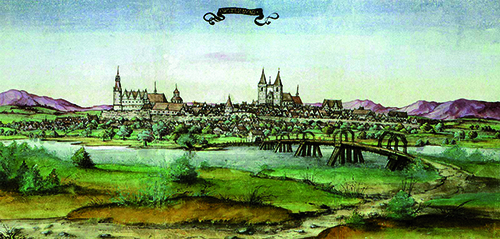Frühjahrstagungen zur Wittenberger Reformation (Wittenberg Spring Conferences)
 The unfolding of the Reformation with its European effects cannot be attributed to a single actor, namely the reformer Martin Luther, but required other multipliers. In Wittenberg, a network of reformers had formed early on, each of whose members contributed in a specific way to the theological profile of the Reformation and its radiance beyond the borders of the city and the Electorate of Saxony. Alongside Luther, Philipp Melanchthon played a prominent role; another influential player was Johannes Bugenhagen. Nikolaus von Amsdorf, Justus Jonas, Johann Agricola, Caspar Cruciger, Georg Rörer, Georg Major and the artist Lucas Cranach the Elder also each contributed in their own way to the development and characteristic shaping of the Reformation and in the process developed thoroughly independent theological profiles.
The unfolding of the Reformation with its European effects cannot be attributed to a single actor, namely the reformer Martin Luther, but required other multipliers. In Wittenberg, a network of reformers had formed early on, each of whose members contributed in a specific way to the theological profile of the Reformation and its radiance beyond the borders of the city and the Electorate of Saxony. Alongside Luther, Philipp Melanchthon played a prominent role; another influential player was Johannes Bugenhagen. Nikolaus von Amsdorf, Justus Jonas, Johann Agricola, Caspar Cruciger, Georg Rörer, Georg Major and the artist Lucas Cranach the Elder also each contributed in their own way to the development and characteristic shaping of the Reformation and in the process developed thoroughly independent theological profiles. This is the starting point for the Wittenberg Spring Conferences. Their aim is not so much to take stock of existing research, but rather to open up new research perspectives on personal and theological historical sources in the context of historical-political developments, social constellations and everyday historical conditions. The conferences, which take place regularly in March at the Leucorea in Lutherstadt Wittenberg, are intended as "working discussions" that provide an opportunity for testing new approaches and for open interdisciplinary discussion.
Organiser: Prof. Dr. Irene Dingel in cooperation with Prof. Dr. Armin Kohnle, Leipzig
XV. Tagung 2023: Johann Agricola aus Eisleben (ca. 1494–1566). Vom Freund zum Gegner der Wittenberger
XIV. Frühjahrstagung 2020: ›An den Rand gedrängt – den Rand gewählt‹. Religiöse Selbst- und Fremdverortung im 16./17. Jahrhundert
XIII. Frühjahrstagung 2019: Die Crucigers. Caspar d. Ä., Caspar d. J. und Elisabeth Cruciger in ihrer Bedeutung für die Wittenberger Reformation
XII. Frühjahrstagung 2016: Wittenberg und der Beginn der Reformation
XI. Frühjahrstagung 2014: Johannes Mathesius (1504-1565)
- Tagungsband: Johannes Mathesius (1504-1565). Rezeption und Verbreitung der Wittenberger Reformation durch Predigt und Exegese
- Tagungsbericht [als PDF]
X. Frühjahrstagung 2012: Gute Ordnung. Ordnungsmodelle und Ordnungsvorstellungen im Zeitalter der Reformation
IX. Frühjahrstagung 2010: Philipp Melanchthon – ein europäischer Reformator
- Tagungsband: Philipp Melanchthon. Lehrer Deutschlands, Reformator Europas (2011)
- Tagungsbericht [als PDF]
VIII. Frühjahrstagung 2008: Der späte Bugenhagen. Wittenberger Bürger, Kirchenpolitiker, Theologe und Stadtpfarrer
- Tagungsband: Der späte Bugenhagen (2012)
- Tagungsbericht [als PDF]
VII. Frühjahrstagung 2007: Nikolaus von Amsdorf zwischen Reformation und Politik
- Tagungsband: Nikolaus von Amsdorf (1483–1565) zwischen Reformation und Politik(2008)
- Tagungsbericht [als PDF]
VI. Frühjahrstagung 2005: Politik und Bekenntnis. Die Reaktionen auf das Interim von 1548
- Tagungsband: Politik und Bekenntnis (2006)
V. Frühjahrstagung 2004: Rezeption und Verbreitung der Reformation am Beispiel von Johannes Mathesius (1505–1565)
- Tagungsband: Johannes Mathesius (1504-1565). Rezeption und Verbreitung der Wittenberger Reformation durch Predigt und Exegese
IV. Frühjahrstagung 2003: Justus Jonas und seine Bedeutung für die Wittenberger Reformation
III. Frühjahrstagung 2002: Kirche und Regionalbewusstsein im 16. Jahrhundert
- Tagungsband: Kirche und Regionalbewusstsein in der Frühen Neuzeit
II. Frühjahrstagung 2001: Die Theologische Fakultät der Universität Wittenberg 1502–1602
I. Frühjahrstagung 2000: Georg Major (1502–1574)
- Tagungsband: Georg Major (1502–1574) (2005)


